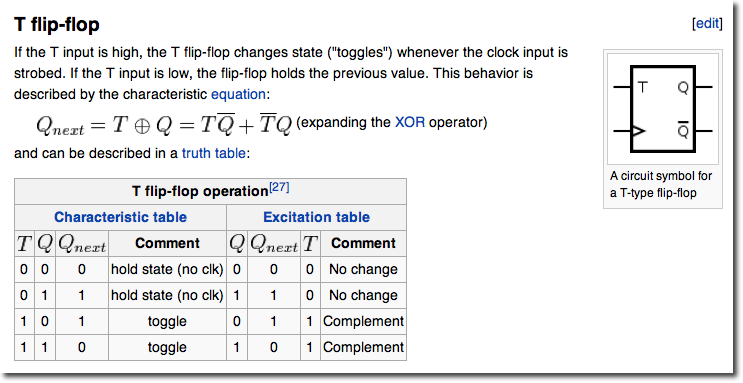Difference between revisions of "CSC270 JK Flip-flop Exercises"
(→Exercise 4) |
|||
| Line 14: | Line 14: | ||
Build a D flip-flop with a JK flip-flop. | Build a D flip-flop with a JK flip-flop. | ||
| + | |||
| + | ==Exercise 5== | ||
| + | |||
| + | Pick a simple 3-state FSM with no outside control signal, and implement it with a T flip-flop. | ||
| + | |||
| + | <br /> | ||
==Exercise 4== | ==Exercise 4== | ||
| + | |||
| + | (This exercise is listed last for better fit on printed pages) | ||
The toggle flip-flop or T flip-flop is defined as follows (taken from [http://en.wikipedia.org/wiki/Flip-flop_(electronics)#T_flip-flop wikipedia]): | The toggle flip-flop or T flip-flop is defined as follows (taken from [http://en.wikipedia.org/wiki/Flip-flop_(electronics)#T_flip-flop wikipedia]): | ||
Latest revision as of 10:42, 7 March 2012
--D. Thiebaut 15:46, 6 March 2012 (EST)
Exercise 1
Use a JK flip-flop to create a toggle flip-flop (one that switches state at every clock tick).
Exercise 2
Build a JK flip-flop with a D flip-flop.
Exercise 3
Build a D flip-flop with a JK flip-flop.
Exercise 5
Pick a simple 3-state FSM with no outside control signal, and implement it with a T flip-flop.
Exercise 4
(This exercise is listed last for better fit on printed pages)
The toggle flip-flop or T flip-flop is defined as follows (taken from wikipedia):

Implement a T flip-flop with a JK and with a D flip-flop.
Exercise 5
Pick a simple 3-state FSM with no outside control signal, and implement it with a T flip-flop.